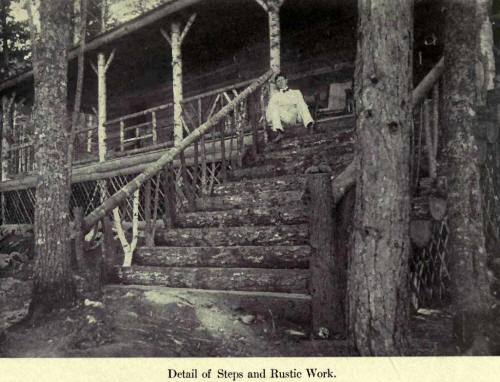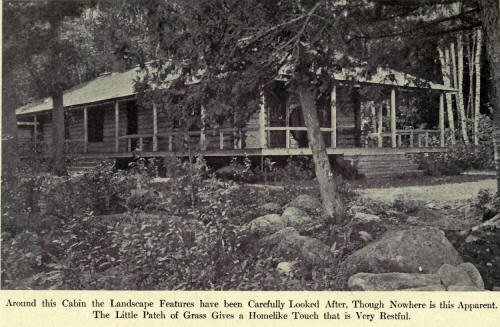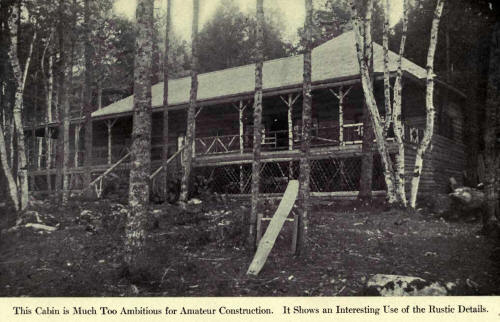|
THERE are two factors
which must be considered when the time comes to fit the cabin to the
situation. First, the fixed meteorological conditions, such as sunshine,
the prevailing summer breezes, etc., and next the outlook. These may
present conflicting claims. It is hard to generalize about unknown
sites, but a few essentials must be kept in mind for any situation.
Give the prospect first
place, for your wood home is to be regarded rather as a shelter into
which you have brought all the great out-doors possible, and to which
you may turn when the real out-doors shall make you seek it. Sunlight
you must have, for part of the day at least, especially during the early
morning hours. It is universally conceded to be more hygienic the more
the camp is exposed to the sunlight. For this reason, when the time for
clearing away the trees comes, thin them out around the camp more than
you have ever intended to do with a wood home. Thus the sunlight and
aromatic odors of the forest will rush in upon you, and the cabin will
take on an added charm.
Of course, you will not
build in a marshy or low situation. In the woods it is well to look for
indications of what occurs during or after a protracted period of rain.
Otherwise you may build in a spot which seems ideal, only to find that
your cabin is directly in the path of all the rushing surface water of
your vicinity. Therefore, seek an elevation so as to have good drainage.

Naturally one of the
first considerations you will give to your future site will be that of
the water supply and its purity, for much depends upon this.
If a spring be at hand it
will more than repay considerable care on your part. Bank up the earth
about it for a considerable distance to discourage surface water from
working its way in, then dig down a short distance and wall the spring
up with either stones or brick laid in Portland cement, the whole
smoothed off as neatly as possible to facilitate the cleansing which
must be done from time to time. A covering of some sort that will permit
active ventilation should now be erected over the spring to keep out
falling leaves and refuse. Care should be taken to keep all rubbish,
etc., as far from the spring as possible. Slop water of any kind should
never be thrown near the spring. To keep the earth clean in the vicinity
of the water supply is of the greatest importance and requires constant
watchfulness.
Should it chance that the
spring is upon an elevation, it would be a simple matter to pipe it into
the house, thus securing running water. The pipes may be laid on the
surface of the ground and disconnected in the winter after having the
water drained from them. It is not advisable to have drinking water
stand. If it is necessary, however, to store it for a time, an
earthenware crock or vessel is the proper thing. This should be well
washed and scalded at frequent intervals.
Ponds and streams are not
desirable sources of supply for drinking water because of the vast
surface drainage they receive.
Should you be fortunate
enough to have a small brook running near, by all means endeavor to dam
it, and thus secure a miniature pond and waterfall. The banks of the
pond may be made glorious with suitable plants, cardinal flowers, etc.,
and such an opportunity to build a curving rustic bridge is not to be
neglected. Cover up your traces, however.
Now, an important feature
of your wood home is proper sewage, and this demands attention. The
outhouse should be built to accommodate, under the seat, a movable box
lined with zinc or, better still, a galvanized iron pail, not too large,
and made to fit close under the seat. This should be supplied with a
layer of dry earth or wood ashes and the contents removed at frequent
intervals, to be buried and covered with earth. Soil near the surface
(if not too sandy) is in a large degree able to destroy organic matter;
the waste should not, therefore, be buried deeply. One foot is quite
sufficient.
Garbage is best disposed
of by burning. If this is not possible, dig a hole for it and cover it
over with earth. A sprinkling of chloride of lime is recommended before
covering. This will lessen materially the number of house-flies.
Look carefully after the
overhanging branches of trees near the camp and trim the dead ones off
to forestall any accidents to your roof or window glass.
Whenever a branch is
removed, whether a dead or a live one, it must be cut off close to and
even with the trunk, no matter how large the wound. The new wood and
bark will then in time cover the denuded space. If the branch is not cut
off close to the tree the projecting stub soon decays, the bark falls
off and the rot penetrates quickly to the heart of the tree.

In removing a large
branch, enough of the outer portion should be first sawed off to prevent
its weight from splitting the wood downward. All wounds should be
covered with white lead, coal tar, or creosote. No pruning should be
done, however, until the fall, if possible.
Occasionally it may be
necessary to remove a rock, and while this looks like a great task, if
the rock is large, yet after all the matter is comparatively simple.
Slaty rocks may be easily separated by starting a wedge in the different
strata and with a few sharp blows an entire slab will loosen and may be
disposed of.
Granite, etc., is a
little more difficult, though if tools are lacking a hot fire may be
built on and around the bowlder. This should be kept going for some
time. Then cold water thrown on the rock will cause it to split and
crack as though a charge of powder had been under it. A good blasting
powder is perhaps the quickest and most efficient, and if you should
decide to use this, get the brand known as Hercules, made by the du Pont
Company, who will send you simple directions for its use.
This brings us to the
question of what is best to be done with the landscape features about
us. With some this means a general clearing up. All the rocks, bushes,
etc., must go. But there are times when the big boulders, which are
never easy to remove, may be made most attractive. Virginia creeper or
honeysuckle will twine lovingly about it if you give them a start, and
doubtless the moss and lichens have already done their work in the
beautifying. At its base the woody plants and ferns may be gathered.
Ferns may be used to advantage in many places, and they will repay the
care you take in setting them in the situations where you desire their
mossy soft green effect. They are best transplanted in the spring or
early summer. Some of the stronger growing may be moved at almost any
time during the growing season. Care should be taken to secure a
good-sized ball of earth with the roots, and then in planting they
should not be buried too deeply, and have the sod pressed firmly about
the roots.
An occasional note of
color may be had in the sunnier situations with either the creeping or
dwarf nasturtiums.
Whatever is done,
however, with plants, should in no sense suggest the city or country
gardens.
Roadways into the camp
are oftentimes desirable, but the building of a road through the forest
is a question of men and teams. Lumbermen estimate that the cost is
about one dollar a rod.
You will be surprised,
however, how much one or two men can accomplish in a day in the matter
of building paths or trails. Prospect over the ground carefully and
decide upon the smoothest and most practical route, then with your ax
blaze the trail. Now commence in the underbrush and small stuff. Some
will have to be cut. Cedar, etc., may be uprooted and dragged out with a
little effort. Throw the rocks and pieces of stumps into the holes;
knock the tops off the hummocks into the low places. Whole sheets of
earth and moss may be stripped from the rocks and used to fill in and
cover with. Thus, with comparatively little effort, a smooth trail
through the woods is made. Should the trail take you over any sudden
depression, build a rustic bridge. Two or three logs laid side by side
will make it, and handrails may as easily be put in place. A little
rustic bridge or flight of stone steps at some unlooked-for point gives
a note of pleasant surprise that is well worth while.
Take extraordinary care
that no fires get started. In the forest it is a common thing for a fire
to work its way underground without a sign, until suddenly it will burst
into a waving flame, terrible and inexorable. Even when you have
apparently stamped out the last spark and flooded the ground with water
the fire may reappear in the next twenty-four hours, burning as
determinedly as before.
If you have brush to
burn, pile it upon the shore as far from the trees as possible, then
wait for a favorable day. This will be immediately after a rain, either
in a calm or with a slight breeze blowing toward the lake.
While there are
innumerable advantages in living in the woods and also many delights,
the mosquito is not to be classed among them. I am told there are two
kinds, one with and one without "a sing." The latter is said to do the
dastardly and deadly work, but all mosquitoes look alike to me. Where
you are unaided in an effort to exterminate these pests you have almost
as much hope of success as a fly on sticky paper. Yet if you will cruise
around the camp for a few rods you will find many breeding places that
might as well not exist. One day's work with these places convinced me
that I could earn a considerable amount of peace for the season by
carefully filling up every hole where water collected, even for a short
period; in hollow stumps, depressions in the rocks, etc. When it was
impossible to fill these up, a small quantity of crude oil was allowed
to spread across the surface. A gallon will spread over acres in swamp
land, and if the dose is repeated every three weeks it proves most
discouraging to the mosquito. A neglected tin can with an inch of water
in it will become the hatchery of some millions. Water is absolutely
necessary to the hatching of mosquito eggs.

If you wish to induce the
ducks to make longer stays with you, and to invite their friends also,
plant wild rice in the shallow water along the shores of the coves or
nearby stretches of still water. Perhaps you have tried planting this in
the past, at no little expense and trouble, and have not yet had the
satisfaction of seeing the first spear appear. The secret is this: the
seeds should never be allowed to dry. There are places where this seed
can be purchased which has been kept in water from the moment of
gathering, and which will be sent you packed in damp moss. This seed
will almost invariably grow. To any one practically interested, who will
write me, I shall be glad to give the address.
Upon request, the United
States Department of Agriculture, through its Forestry Bureau, will send
you pamphlets, etc., that will be of the utmost importance if you own
more than an acre or two of wooded land. Wood lots to which the
principles of forestry have never been applied very commonly offer a
good chance for "improvement cuttings." The purpose of such cutting is
to secure heeded material, utilize timber which would otherwise go to
waste, and make room for other trees to grow. In making improvement
cuttings, look especially for two classes of trees in addition to those
already indicated as desirable for removal. These are (1) over-mature
trees which are beginning to decay and will rapidly lose their value,
and (2) "suppressed" trees—that is, those whose crowns have been
overtopped by their neighbors so that they can no longer compete for
room. A few years of careful cutting in your lot will greatly increase
the beauty of your stand of trees. Meantime you will be abundantly
supplied with firewood.
An ice house is almost
necessary where the camp is occupied during the warmer months, and where
you are compelled to rely on a private supply of ice you will do well to
erect a place for its storage.
Ice may be readily kept
in a structure of logs that has been thoroughly chinked or calked,
digging down into the earth if you desire, though a building on the
surface does quite as well, particularly in a woody position, where the
trees give almost continual shade. The door should be made hollow and
the space between filled with sawdust. Ten by twelve feet square and
seven feet to the eaves would be about the right size. A floor should be
made of poles set not too tightly together, to allow a free outlet for
the melting ice. At the peak a small hole should be left for
ventilation, and this should be covered with a screen to prevent
insects, birds and vermin from getting inside.
A neighbor will fill this
house with ice in a day, so that aside from the sawdust and the hauling
of the same the cost is trifling and the advantage great.
In storing the ice the
cakes should be kept six or eight inches from the walls all around and
the space between well packed with sawdust. Then, besides, the cakes
should all be thoroughly packed on every side with sawdust to prevent
their freezing together and also to assist in preserving them.
A boathouse is part of
the equipment of the camp, and may be made an attractive feature, for
with it may be combined dressing rooms for the bathers, to say nothing
of an outlook from a balcony. The height of the water even on lakes is
constantly changing, and this demands a float to make the landing of
canoes or the embarking into launches easy. The raft idea may be
employed, though it should be remembered that the float must be drawn
out of the water during the winter, and logs are much too heavy to
handle. Casks are the thing, and with a little ingenuity they may be
framed in such a manner that the whole float may be readily taken apart
and drawn ashore.
Put a roller on the end
of the float, so that canoes or rowboats may be drawn up on it with as
little damage as possible, and it would not be amiss to pad a portion of
the edge of the float with cushions of burlap or canvas stuffed with
soft material, to act as fenders and save the paint and varnish. A
gangway will lead from the float to the boathouse, and a small padded
truck will facilitate the matter of getting the floating stock under
cover away from the weather. |

